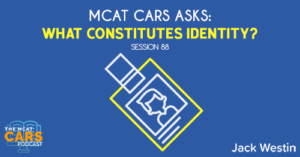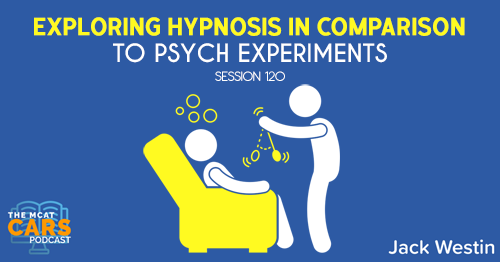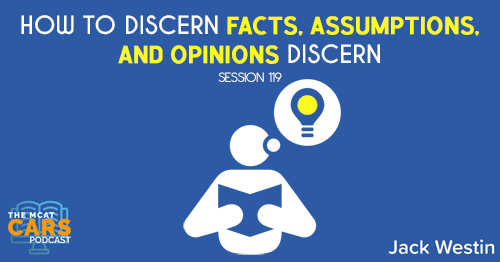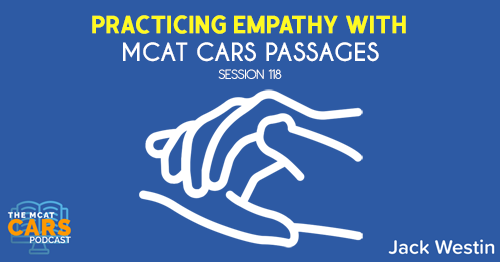Apple Podcasts | Google Podcasts
Session 88
Security questions on the internet have way too many assumptions. Today’s passage is a good example of this social issue called microaggression. It’s also something that you will potentially experience with your future patients – so be careful!
As always, I’m joined by Jack Westin from JackWestin.com. They have amazing free resources for you to practice your CARS prep and other stuff including their daily MCAT CARS passages emailed to you every day. They also have the Khan Academy passages.
Listen to this podcast episode with the player above, or keep reading for the highlights and takeaway points.
Link to the article:
https://reallifemag.com/who-goes-there/
I bought my first car in 2006 — the only car I’ve ever owned. I had moved to Southern California from far away, and soon realized that the bus wasn’t going to cut it. For $2000 I bought an ’89 Volvo 760, a totally uncool sedan, and made a friend drive it home for me because I was terrified. A few days later, though, I was chugging down the freeway, singing along to the radio as I passed strip malls and gas station clusters. It was a revelation: Driving through the California suburbs was like being at the center of so many stories I’d previously consumed only through television, stories, and songs. What’s more, I finally had an answer for that most common of security questions: “What was the model of your first car?”
In security question terms, I grew up lucky. I have a mother with a maiden name and a father whose middle name I know. I had a childhood pet. I don’t have a favorite high school teacher, but I did have an elementary school, and, eventually, a first car. With these precious facts, I have been able to navigate the sign-up pages of online bank websites and ensure a back-up method if I’m locked out of my Skype account. In other words, I’ve lived an easeful life when it comes to making the internet work for me and being recognized as a legitimate subject online. Not everyone has that privilege.
What is assumed of us, and what identities are we asked to assume, in order to move through the world of the internet? The basic request for a mother’s maiden name requires so much: It asks for a mother, married, who took her spouse’s name, with whom you have enough of a relationship to know her first surname. But what about those of us without one mother, raised by queer parents or grandparents or adopted or in foster care, or with mothers that never relinquished their “maiden” names? For those whose lives have followed an alternative temporal logic (for instance, what Jack Halberstam describes as “queer time,” an experience of chronology “in opposition to the institutions of family, heterosexuality, and reproduction”), or those living with economic precarity that precludes property ownership or stable employment, the basic act of verifying your identity online is a minefield of unanswerables and discriminatory narratives. Security questions rest on unexamined assumptions about what constitutes identity, and what biographical details can be assumed as universal, private, and memorable to internet users. They are a form of quiet disciplinary power; specifically, they help enforce the hegemonic subjectivity required to provide an effective and sustained labor force.
While security questions have declined in popularity as a mode of online identity verification since their peak in the mid-aughts, the newer security protocols that have replaced them are not free of hegemonic power. The waning of the security-question era was concurrent with the development of a new regime of labor and social organization — one characterized by omnipresent surveillance and ubiquitous work, shaped and accelerated by digital technology and the internet — which required a new form of worker discipline. Like the security questions before them, the new verification protocols are easy to take for granted. In looking at the ways we are asked to identify and verify ourselves online, we can catch a glimpse of the disciplinary tools that are shaping us into the kinds of subjects and workers required by the economic system in which we live.
[02:04] How to Translate CARS to the Other Sections
The whole test is reading. Regardless of the section, you have to read a passage that you’re unfamiliar with, find ideas, and use those ideas to answer questions.
There will definitely be questions on the science sections that can be answered through general knowledge and just basic understanding of science principles. But that’s not the majority of the exam because that entails maybe 30%-40% of the exam at most. The other 60%-70% is based purely on reading.
[04:31] Paragraph 1, Sentence 1
I bought my first car in 2006 — the only car I’ve ever owned.
Jack says:
The author bought their first car in 2006. And it’s the only car they’ve owned.
[04:50] Paragraph 1, Sentence 2
I had moved to Southern California from far away, and soon realized that the bus wasn’t going to cut it.
Jack says:
So the author moved to Southern California and the public transportation wasn’t good so they bought a car.
[05:11] Paragraph 1, Sentence 3
For $2000 I bought an ’89 Volvo 760, a totally uncool sedan, and made a friend drive it home for me because I was terrified.
Jack says:
The author mentions a Volvo 760 but why was the person terrified? Was this the first car they’ve ever driven? It’s the author’s way of connecting with the reader in sharing an embarrassing point to make it seem more believable and more authentic. It conveys personality.
[06:21] Paragraph 1, Sentence 4
A few days later, though, I was chugging down the freeway, singing along to the radio as I passed strip malls and gas station clusters.
Jack says:
The author here is painting this different picture in the last sentence they were terrified. Then the next sentence says they’re chugging down the highway and the freeway, singing along and passing all these places, not terrified.
[06:50] Paragraph 1, Sentence 5
It was a revelation: Driving through the California suburbs was like being at the center of so many stories I’d previously consumed only through television, stories, and songs.
Jack says:
The author is giving this analogy to what you see in movies where people are driving their car in the suburbs with lots of palm trees around.
[07:23] Paragraph 1, Sentence 6
What’s more, I finally had an answer for that most common of security questions: “What was the model of your first car?”
Jack says:
It’s a big twist from this really nice story to now they know the answer to their security question.
[08:00] Paragraph 2, Sentence 1
In security question terms, I grew up lucky. I have a mother with a maiden name and a father whose middle name I know.
Jack says:
More security question stuff. You have to assume that the security questions ask about these.
[08:44] Paragraph 2, Sentence 2
I had a childhood pet.
Jack says:
Another common security question.
[08:51] Paragraph 2, Sentence 3
I don’t have a favorite high school teacher, but I did have an elementary school, and, eventually, a first car.
Jack says:
Some more common questions.
[09:01] Paragraph 2, Sentence 4
With these precious facts, I have been able to navigate the sign-up pages of online bank websites and ensure a back-up method if I’m locked out of my Skype account.
Jack says:
The author here is basically saying where these questions come into play such as when signing up for online bank websites and for Skype accounts stuff, etc.
[09:23] Paragraph 2, Sentence 5
In other words, I’ve lived an easeful life when it comes to making the internet work for me and being recognized as a legitimate subject online.
Jack says:
Again, the author here is painting this picture of having all of those things – the mother with a maiden name, a father with a middle name, an elementary school teacher. And a car now makes it easier to have this internet life.
[09:47] Paragraph 2, Sentence 6
Not everyone has that privilege.
Jack says:
So random little twists here going from this Volvo to now the privilege of being able to answer these questions.
[10:43] Paragraph 3, Sentence 1
What is assumed of us, and what identities are we asked to assume, in order to move through the world of the internet?
Jack says:
The author here is asking this question of what is assumed of us. What identities do we need to assume to have this internet life.
[11:05] Paragraph 3, Sentence 2
The basic request for a mother’s maiden name requires so much: It asks for a mother, married, who took her spouse’s name, with whom you have enough of a relationship to know her first surname.
Jack says:
This is a problem when you bring in your own biases. Like the mother doesn’t have to be married to have a maiden name. And the maiden name can just be your name all along.
That is actually very important to do on CARS because they may contradict themselves. The questions will ask about those contradictions. And this is not bad at all. It’s actually encouraged. But what you don’t want to do is put words into the author’s mouth. There’s a difference.
'Questioning what the author's saying is good. But adding to what the author saying is bad.'Click To Tweet[12:21] Paragraph 3, Sentence 3
But what about those of us without one mother, raised by queer parents or grandparents or adopted or in foster care, or with mothers that never relinquished their “maiden” names?
Jack says:
The author here is challenging us why we ask for this maiden name. Apparently, it assumes a lot of us.
[12:49] Paragraph 3, Sentence 4
For those whose lives have followed an alternative temporal logic (for instance, what Jack Halberstam describes as “queer time,” an experience of chronology “in opposition to the institutions of family, heterosexuality, and reproduction”), or those living with economic precarity that precludes property ownership or stable employment, the basic act of verifying your identity online is a minefield of unanswerables and discriminatory narratives.
Jack says:
We’re bringing up here this other person Jack Halberstam, who talks about this experience of chronology. There are people out there who live different lives and answering these questions may be hard for them. Put yourself in their position. The author is really good at transitioning from a story to a social issue dear to their heart.
Part of that embarrassing story, again, is to make the author more likable. When you’re more likable, you’re more likely to believe them. The author does an excellent job. Although there are some faults. Do you need to have a mother that’s married to have a maiden name? Maiden just means before marriage. And to that extent, maybe the author is wrong. But what about these other things that the author is saying? What if you don’t have a mother? What if you never met your mother? What if you grew up with two moms?
So these do raise some sort of alarm for the author and you don’t have to agree with them. Not saying you should, but you have to listen to them.
“Listening is all that you need to do for CARS.”Click To Tweet[15:08] Paragraph 3, Sentence 5
Security questions rest on unexamined assumptions about what constitutes identity, and what biographical details can be assumed as universal, private, and memorable to internet users.
Jack says:
The author is saying that there’s a lot of assumptions that are being made with these questions.
[15:33] Paragraph 3, Sentence 6
They are a form of quiet disciplinary power; specifically, they help enforce the hegemonic subjectivity required to provide an effective and sustained labor force.
Jack says:
Going back to the previous sentence, security questions rest on unexamined assumptions. So basically, they’re assuming you have these things. Again, the whole privilege aspect. And then the next sentence says they are a form of quiet disciplinary power. So they’re trying to sort that out. What the author is probably trying to say here and they’ll probably expand on it by asking you these questions is that they’re making you have these expectations of how life should be.
By asking you these questions, they’re establishing some sort of power over you into how you should live your life.
Hegemonic just means leadership and power over something. So there’s this subjective sort of power relationship. Where they think if you have these norms, you have a good labor force.
It’s very deep. But you should notice the keyword of power or hegemony or just the unexamined assumption. Unfairness or inequality is really what the author’s trying to get at, but also this idea of the power struggle. So being able to visualize this, not necessarily understand it fully, but just enough to be able to figure out where the author’s going is enough.
[17:32] Paragraph 4, Sentence 1
While security questions have declined in popularity as a mode of online identity verification since their peak in the mid-aughts, the newer security protocols that have replaced them are not free of hegemonic power.
Jack says:
So there’s the original questions that they brought up. Apparently, they are becoming less popular, but the new way that security questions are being asked still has some issues. The author doesn’t seem to like this power struggle. That’s an assumption that we can definitely make is that this hegemonic power is not good for society. And this may be something they would ask on the MCAT.
[18:24] Paragraph 4, Sentence 2
The waning of the security-question era was concurrent with the development of a new regime of labor and social organization — one characterized by omnipresent surveillance and ubiquitous work, shaped and accelerated by digital technology and the internet — which required a new form of worker discipline.
Jack says:
Waning means going away. The security question era was concurrent. It was happening at the same time as this new regime of labor and social organization. This ties back into how there’s power over the workforce.
The author is actually sort of surrendering by saying that it’s waning. The author’s trying to transition from saying that security questions are dying. We don’t have security questions anymore. But there’s still some issue in the labor force. And this one now is more about surveillance and this ability of digital technology to take over again as another form of power. So the power is shifting. It’s going from security questions to surveillance. I think that’s the key that the author really wants you to know.
Again, the author has been doing this the whole time. We shifted directions really suddenly. We went from talking about a Volvo to talking about security questions to talking about power, to now, talking about surveillance. So the author is really quick to jump. And if you notice, you can still predict what’s going to happen.
“Be open-minded to whatever comes in. Don't suggest that the author can't do something because they could do anything they want.“Click To Tweet[20:31] Paragraph 4, Sentence 3
Like the security questions before them, the new verification protocols are easy to take for granted.
Jack says:
They’re saying there’s new technology. That’s probably going to be taken for granted just like how security questions are. We just accept the security questions we’re given. We don’t assume or understand anything about its implications. At this point, the author’s saying we just have to be more cautious about the next thing that’s coming up.
[21:20] Paragraph 4, Sentence 4
In looking at the ways we are asked to identify and verify ourselves online, we can catch a glimpse of the disciplinary tools that are shaping us into the kinds of subjects and workers required by the economic system in which we live.
Jack says:
The author’s stretching this so far, going from security questions as unfair to security questions as a way to convey power or authority over us. To administer power and authority over us is a really, really tough argument to sell but this is how the author is doing it. The author’s trying to connect the security question to hegemonic power and to effective sustained labor force. It’s a way to sustain our labor force to now saying, it’s not just security questions. So we have to be careful.
'It's not our job to necessarily decide if this is right or wrong. But it's our job to question how strong it is.”Click To TweetFirst, understand it, and then decide. How is the author supporting this? How is the author expanding on this? You can decide that. But you can’t decide if they’re right or wrong. You can’t decide what they’re saying. You can’t change their opinions. As long as you can separate those two, you’ll be fine.
[23:34] An Important Note for Our Future Doctors
This passage is a good example for students to think about a common term called microaggression. For example, you’re in the hospital and you’re taking care of an elderly gentleman who needs to be discharged home. And you ask if his wife is going to be at home to take care of him. And that’s assuming it’s a heterosexual male who’s also married and who’s living with his wife.
Now, there are all of these assumptions that you’re making about the person that may make him feel uncomfortable. Instead, you could just ask if there’s anyone who can take care of him at home. It’s a very basic question that leaves it open.
So it’s just very interesting to not have these little microaggressions which you may think don’t mean anything. But over time, when all these questions are forcing you into this bucket like this article is saying, you just feel like you don’t belong in society because you’re not fitting all of these things.
“Identity verification questions are one of those forms of microaggression. They're packed with these ideological assumptions that are sensitive.”Click To TweetThat’s what the author is trying to point out here. And that’s the whole point of this is to keep people more open-minded, to have more perspectives, and even have more new ways of going things.
Links:
Link to the article:
SEARCH SITE
SEARCH SITE
LISTEN FOR FREE












